Twenty years on, Tzu Chi volunteers who bore witness to the Nipah virus outbreak in Negeri Sembilan in 1999 reflected on their time spent extending moral support to affected families and offering assistance to the locals. It was a memorable experience that reinforced in them the selfless spirit of volunteerism.
On April 28, 2019, five Tzu Chi volunteers and staff members gathered to revisit a piece of history – the Nipah virus outbreak that swept through the nation’s largest pig farming area in Negeri Sembilan in 1999.
The motley crew of five included Ow Chen Chuen, who was a core volunteer of Tzu Chi Seremban in its early founding days; Loh Nyok Moi, who has been actively devoting herself to relief work; then novice volunteers Sim Yew Wai and Wong Siew Chin; and Hong Lee Sear, who had just joined Tzu Chi Malacca as a staff member.
As soon as Chen Chuen produced his collection of yellowed newspaper clippings from 20 years ago, the group launched into individual recollections of the bygone years. Browsing through copies of Tzu Chi Monthly from 1999 evoked nostalgic memories of their youth.
The group’s journey back in time was punctuated by lapses in memory, but flashes of uncertainty were soon replaced by growing conviction as they pieced together an account of the Nipah virus outbreak from fragments of the past excavated from the deepest recesses of their minds.
Taking prompt action
When the Nipah virus first broke out in Negeri Sembilan, its origins and potential impact were largely unclear. It was later verified as a new strain of virus,wiping out large numbers of livestock and poultry.The rising casualty count caused widespread fear among pig farmers across the nation, who were also at risk of being infected by the virus. The pig-farming industry was battered, and the consequences spilled over to the food and beverage industry and animal feed manufacturers, in addition to adversely affecting small-scale businesses such as sundry shops.
Chen Chuen lived in the village of Sikamat, Negeri Sembilan, with his family, who ran a restaurant. During the outbreak, the family business suffered a decline of 60 to 70 percent. Yew Wai, who peddled cakes and biscuits at Bukit Pelanduk, had also seen his business fall by 30 percent.
Chen Chuen recalled that the onset of the virus outbreak was essentially unforeseen. News of the epidemic soon reached Master Cheng Yen in Taiwan, who contacted two Taiwanese volunteers based in Tzu Chi Malacca, David Liu and his wife, Echo Chien, and requested them to evaluate Tzu Chi’s prospective role in providing relief from the outbreak. The husband-and-wife couple managed to liaise with Chen Chuen, and together, they promptly initiated month-long relief efforts.
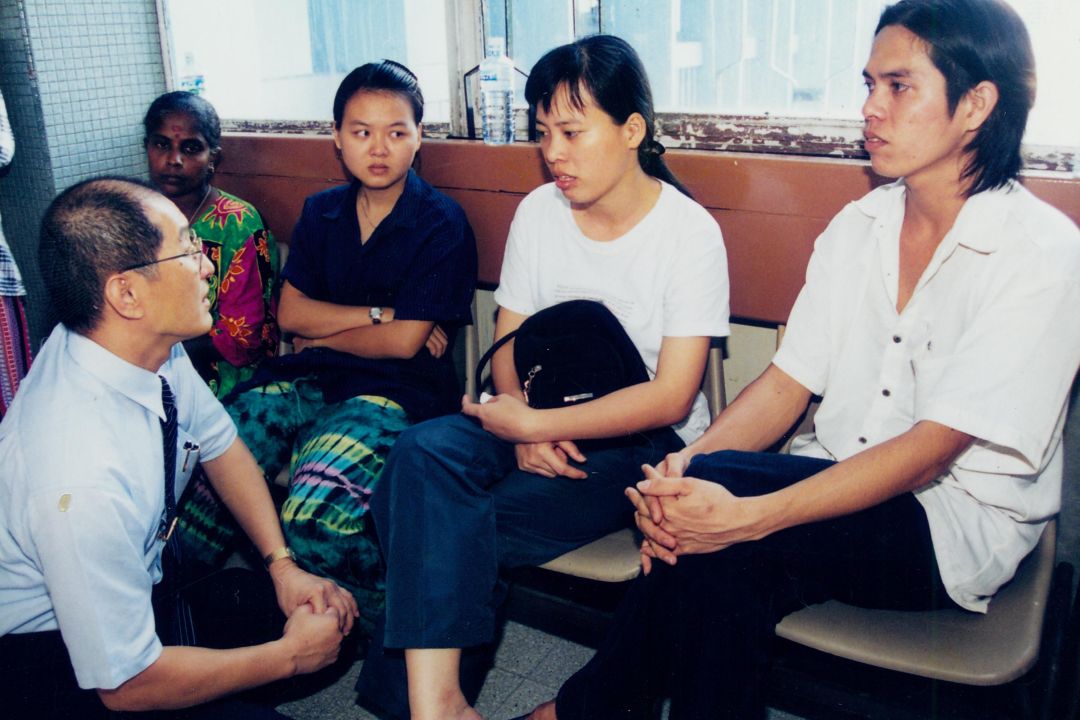
To curb the spread of the virus, New Villages identified as potential breeding grounds for the virus were quarantined, the villagers were relocated, pigs were culled, and infected patients were sent to the University Malaya Medical Centre in Kuala Lumpur and Tuanku Ja’afar Hospital in Seremban for treatment. Tzu Chi volunteers were denied entry into the Tuanku Ja’afar Hospital to administer care to the families of Nipah patients, as the circumstances surrounding the outbreak were still vague. However, with help from the late Seremban state assemblyman, Dato’ Dr Yeow Chai Thiam, the volunteers were later allowed to set up a booth in one of the hospital corridors to provide provisional care to the patients’ families. Volunteers from Seremban, Kuala Lumpur and Malacca assumed shift duties at the booth to provide emotional support to the patients’ families.
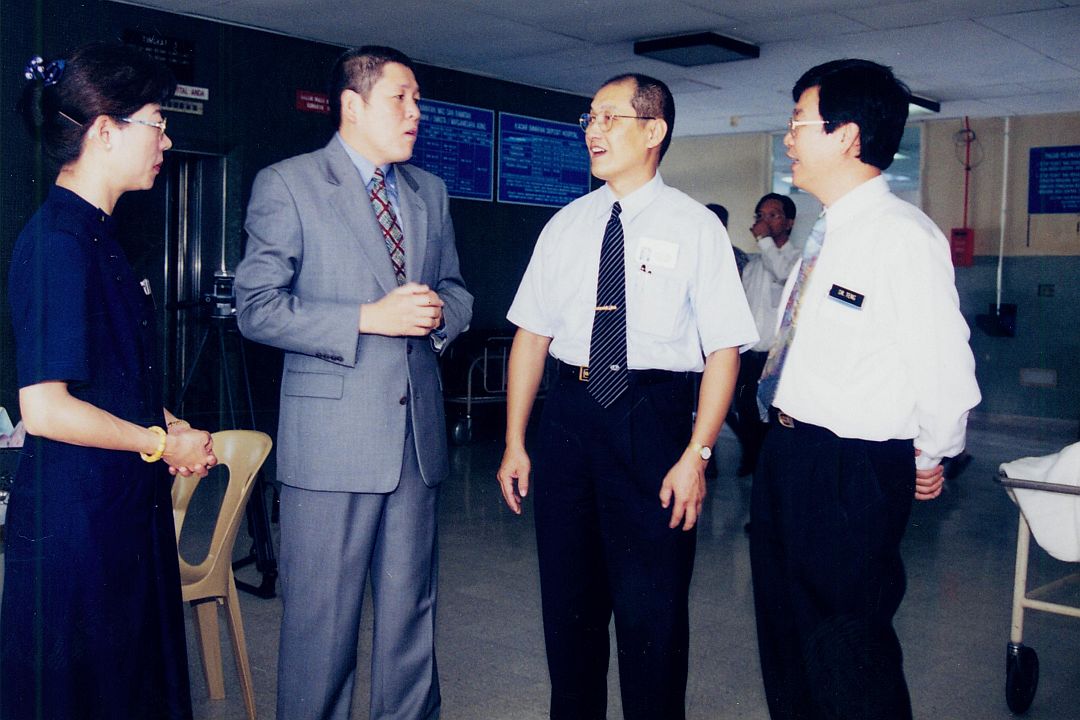
The volunteers eventually received the green light to set up the booth with the intervention of the late Seremban state assemblyman, Dato’ Dr Yeow Chai Thiam’s (2nd from left). [Photograph courtesy ofTzu Chi Malacca]
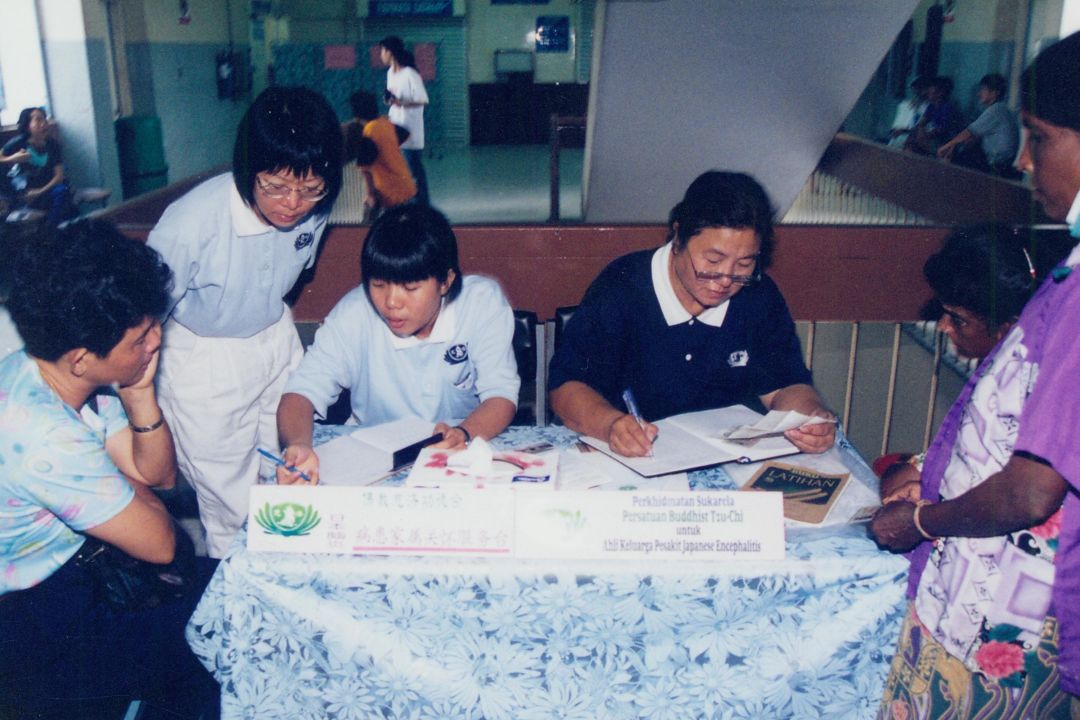
In March 1999, volunteers established a booth in the Tuanku Ja’afar Hospital, Seremban to provide care to the families of hospitalized patients. [Photograph courtesy of Tzu Chi Malacca]
Providing care to distraught families
The setup of the booth was simple, comprising only a desk and four chairs, serving as a space for the volunteers to console distressed family members, besides recording the families’ particulars and supplying drinking water and bread.
“Whenever we saw a body being carried out of the ward or heard cries of anguish, we immediately sensed a recent death. We would approach the grieving family and lend them a shoulder to cry on. Tzu Chi played a significant role in serving as a pillar of strength for the bereaved families,” recounted Lee Sear, who was 22 at the time of the outbreak. Originally from Malacca, she was stationed at the Tuanku Ja’afar Hospital to compensate for the lack of manpower. She witnessed the dilemma of the volunteers who were so overwhelmed by the emotional reactions of the bereaved families that they were at a loss for words, yet they sympathized deeply with the families and tried their best to comfort them.
When Lee Sear was serving the day shift at the hospital, she sought temporary boarding at the home of Seremban-based volunteer Nyok Moi. Now, they were finally reunited after 20 years apart, and reminisced on their time spent together.
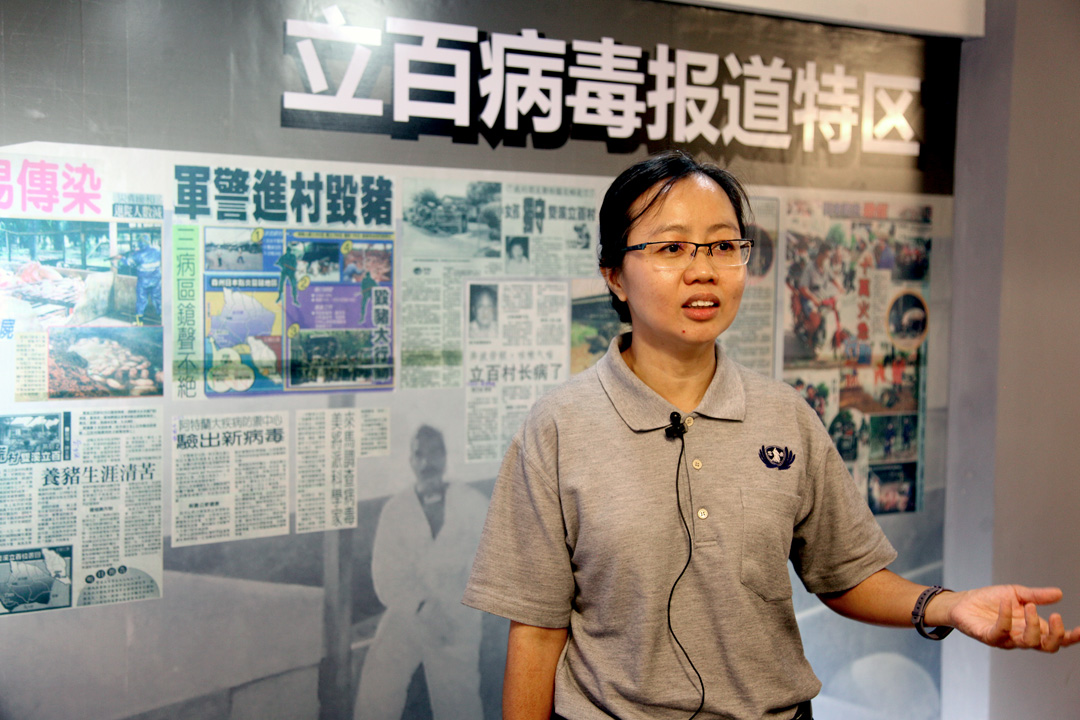
“I was naive then, and had no qualms volunteering at a hospital. During my time there, I met a patient in his 20s who slipped into a coma the day after we chatted together. My close encounters with many patients who were paralysed or lost their lives were profound lessons on the unpredictability of life,” mused Nyok Moi.
Yew Wai interjected and shared that as an inexperienced volunteer back then, he was unprepared for the demands of his role in providing care. He confessed to being unable to hold back his tears as he empathized with the grief of the bereaved.
Going the extra mile
“The uncertainty surrounding the epidemic and media reports of the outbreak made me hesitate to volunteer at the hospital. Furthermore, my family objected to it, so I had to leave for the hospital discreetly and change into my volunteer’s uniform there,” Chen Chuen revealed. Nevertheless, he managed to overcome his fear and derived his strength from Master Cheng Yen’s reassuring messages of concern to take up the responsibility of leading the Seremban-based volunteers with David Liu and Echo Chien.
Yew Wai chimed in, adding that it was the norm to keep a safe distance from anyone who had set foot in hospitals for fear of being infected with the virus. Siew Chin echoed his sentiments, saying, “As soon as I arrived home from the hospital, I assured my mother that I would change into clean clothes and wash my soiled clothes thoroughly to ensure peace of mind for my family.”
The volunteers were commended by the hospital authorities for being the only volunteer organization to reach out to the patients and their families, even at the height of the outbreak. One of the doctors even praised Nyok Moi, commenting, “You have done a good job.”
Reaching out to the locals
After the epidemic had been brought under control, the volunteers’ on-duty hours were reduced by half as the patients were gradually discharged from the hospital. The patients expressed their hope for the volunteers to extend their services by visiting the homes of other families affected by the outbreak to administer care.
In response to the patients’ request, volunteers from Seremban made their way to Bukit Pelanduk, Negeri Sembilan, a village implicated by the epidemic. “The locals have been rearing pigs for generations, so it’s little wonder the odour of pig manure could be detected from afar. A mass culling of pigs was carried out by the authorities when the Nipah virus broke out. The carcasses were sealed in black plastic bags and were either buried or disposed of indiscriminately,” noted Nyok Moi and Siew Chin.
“This place used to be a land of affluence. The villagers spent lavishly and carried around wads of cash. However, following the Nipah virus outbreak, businesses went bust. The villagers vacated their houses and left them unkempt. Some of the abandoned houses were even looted. The epidemic turned the once-thriving village into a ghost town,” recalled Chen Chuen and Yew Wai.
As the village fell into a state of decline, the volunteers organized an extensive search to track down 449 affected pig farmers and their families who had relocated elsewhere and distributed emergency relief supplies to them.
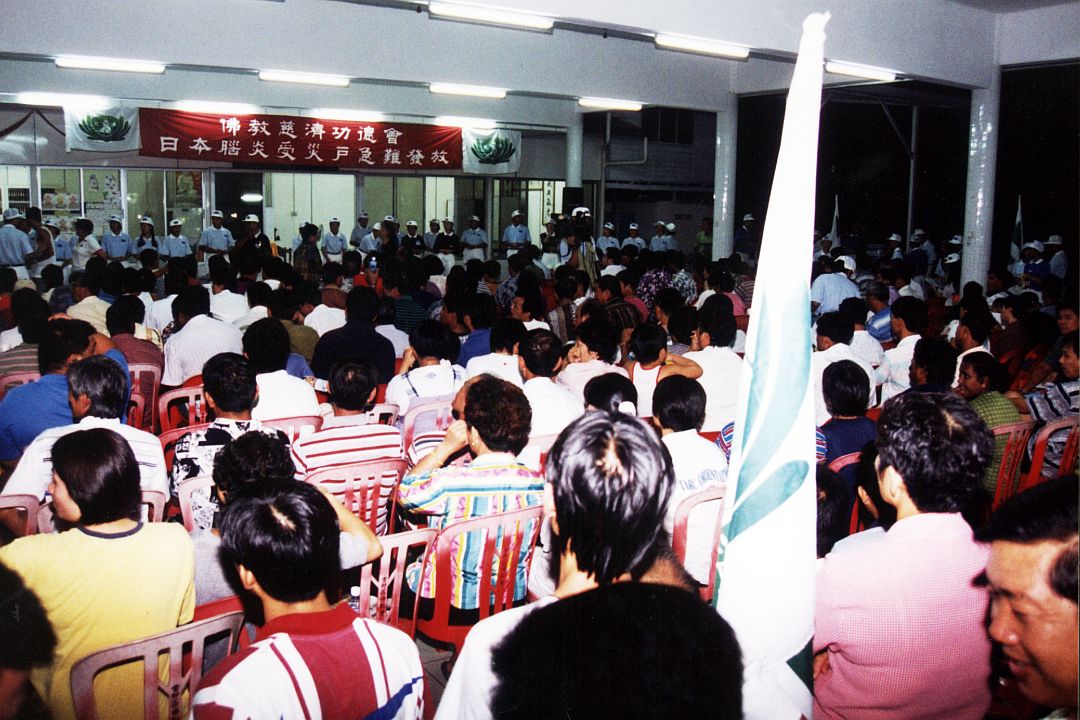
On April 11, 1999, Tzu Chi distributed emergency relief supplies on a large scale for the first time, benefitting 449 pig farmers and their families. [Photograph courtesy of Tzu Chi Malacca]
Lessons learnt
Although two decades had since passed, memories of the Nipah virus outbreak remained deeply etched in the volunteers’ minds.
“It was only my first or second year as a Tzu Chi volunteer when the Nipah epidemic broke out. It was heartbreaking to witness first-hand the devastation of the families who lost their loved ones. That was when I fully understood the importance of empathy,” said Siew Chin, who was reminded by the epidemic that one should not hesitate to perform charitable deeds and fulfil one’s filial obligations before it is too late. She has served in Tzu Chi for more than 20 years since.
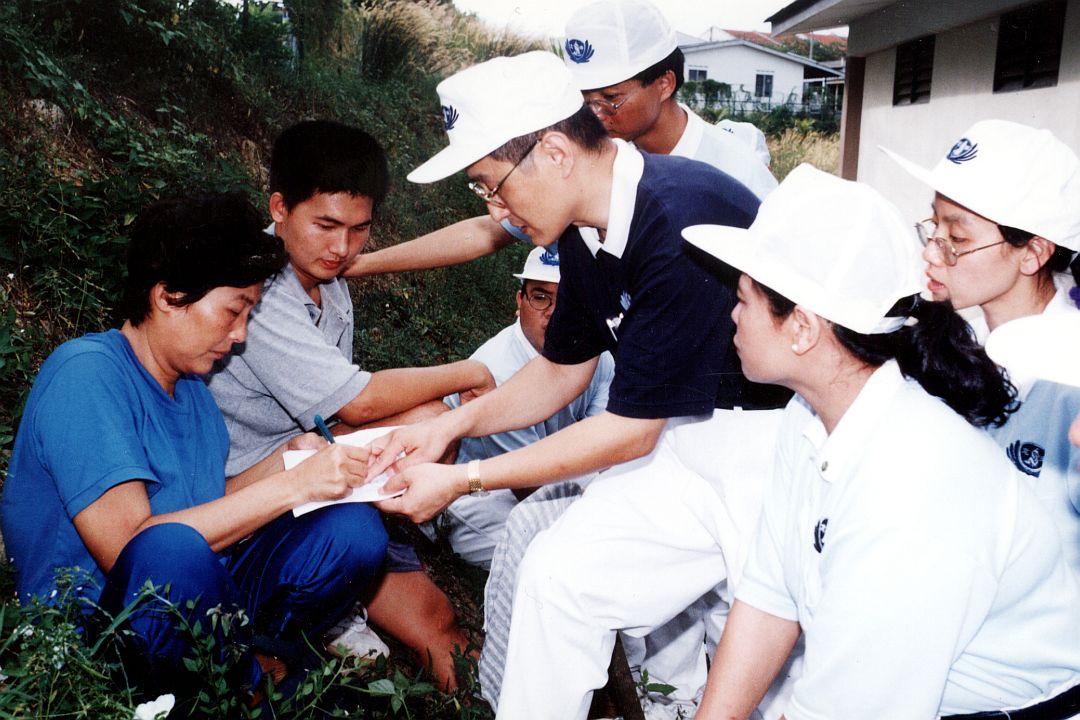
The volunteers provided cash relief and expressed concern for a pig farmer who lost her husband and son to the epidemic. [Photograph courtesy of Tzu Chi Malacca]
“News reports on the mass culling of pigs surfaced in the press almost daily, and this left a significant impact on me as I was overwhelmed by the thought of the negative karma generated by these acts of mass slaughter. At the time, the concept of vegetarianism was still relatively new. Master Cheng Yen had yet to explicitly push for vegetarianism, but mentioned the mass slaughtering of livestock is associated with the workings of karmic law. I felt uneasy whenever I read about the mass culling of pigs in the news. Hence, we gave the Master our full support in her efforts to promote vegetarianism,” shared Lee Sear.
In the two to three years following the Nipah epidemic, everyone avoided pork like the plague. Chen Chuen’s parents, who owned a restaurant then, substituted pork-based ingredients in their dishes with vegetarian alternatives while waiting for the tide to turn.
“Brother David Liu and Sister Echo Chien were aware that our business was affected and encouraged us to reinvent our business out of concern, but my parents were reluctant to give up on the family restaurant that we had operated for four decades, along with the hard-earned acclaim from both local and international media outlets,” said Chen Chuen.
Chen Chuen was influenced by Master Cheng Yen’s call to embrace vegetarianism and heeded Liu and Chien’s advice to remodel his business. He subsequently started anew by procuring a food stall serving vegetarian dishes in a bid to promote vegetarianism.
“Memories of the Nipah virus outbreak may eventually fade from our collective consciousness, but for me, the impact of the incident served as a valuable lesson. My business took a hit and my family’s finances were inevitably affected. Faced with the negative turn of events, I contemplated taking a proactive part in initiating change by promoting vegetarianism. The outcome was surprisingly encouraging – my family regained financial stability and my mission to spread the word on vegetarianism had been accomplished,” said Chen Chuen.
•
The volunteers looked back fondly on the misadventures only their youthful, intrepid selves 20 years ago would have had the nerve to pursue. At the same time, they were eager to note that it was their fearless, indefatigable spirit as pioneering forces that sustained the then-newly established Tzu Chi Seremban and ensured its growth to its present stature.
The volunteers’ tireless dedication deserves to be immortalized in the pages of Tzu Chi’s history, a testament to their unwavering belief in the power of compassion to relieve suffering in times of strife and uncertainty.


![Twenty years on, the volunteers involved in relief efforts during the Nipah virus outbreak gathered to take a trip down memory lane. From left: Hong Lee Sear, Ow Chen Chuen, Wong Siew Chin, Loh Nyok Moi and Sim Yew Wai. [Photograph by Low Siew Lian] Twenty years on, the volunteers involved in relief efforts during the Nipah virus outbreak gathered to take a trip down memory lane. From left: Hong Lee Sear, Ow Chen Chuen, Wong Siew Chin, Loh Nyok Moi and Sim Yew Wai. [Photograph by Low Siew Lian]](/images/Articles/CS/2019/20190428_LSL01_1_011.jpg)



